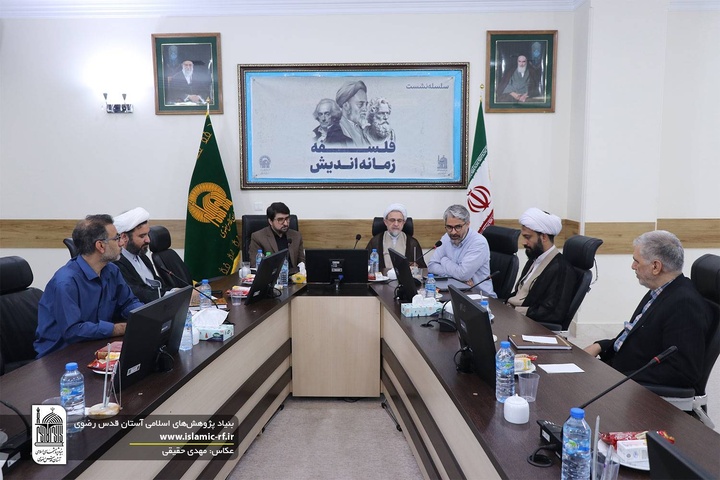The session, held at Sheikh Tusi Hall of Islamic Research Foundation, featured Hoj. Ali Mesbah Yazdi and Dr. Jahangir Masoudi.
The discussion focused on the relevance of Islamic philosophy in addressing contemporary challenges and its ability to remain dynamic and responsive to societal needs.
Speaking in the session, Hoj. Mesbah Yazdi emphasized the importance of defining key philosophical concepts, stating: “Many disagreements stem from misunderstandings. There are three essential characteristics of Islamic philosophy: alignment with Islamic certainties, inspiration from Islamic teachings, and rational defense of religious doctrines”.
He argued that any philosophical discourse engaging with Islamic principles through rational inquiry qualifies as Islamic philosophy.
Dr. Masoudi examined the capacity of Islamic philosophy to address modern social, political, and psychological challenges, noting that it has traditionally focused on metaphysical and ontological discussions.
He contrasted this with Western philosophy, which actively engages with contemporary societal concerns.
“Islamic philosophy needs to evolve and provide rational solutions to modern dilemmas”, he stressed.
The discussion also explored the necessity of philosophical dynamism, with Dr. Masoudi asserting that “philosophy must adapt to new realities and offer fresh perspectives”.
He argued that philosophical stagnation leads to outdated responses, making it imperative for Islamic philosophy to remain intellectually agile.
Hoj. Mesbah Yazdi further highlighted the urgency of making Islamic philosophy more effective, criticizing its limited engagement with pressing social issues such as justice, ethics, and governance.
“Philosophers bear a significant responsibility in revitalizing Islamic thought”, he insisted.
He also pointed out: “Philosophy, as an intellectual discipline, must operate within rational frameworks, and philosophical inquiry cannot exist without fundamental premises. There are no foundational principles that would equate to rejecting rational thought itself”.
Elsewhere in his remarks, Dr. Masoudi touched upon the distinction between dogmatic and critical philosophy, referencing Kant’s classification.
“Critical philosophers remain open to questioning even fundamental assumptions, making them more adaptable to intellectual progress. Unlike dogmatic thinkers, critical philosophers continuously refine their perspectives, embracing new knowledge”, he argued.
The debate also touched on the necessity of methodological pluralism in philosophical inquiry.
According to Dr. Masoudi, knowledge systems should not be restricted to foundationalist approaches, advocating for coherence-based epistemology, where different knowledge components reinforce each other’s validity”.
He further emphasized that philosophical inquiry should not be rigid, suggesting that philosophers must remain open to change, challenge existing doctrines, and integrate evolving intellectual insights into their work.
The session concluded with a Q&A segment, where scholars addressed audience inquiries on the challenges and requirements of contemporary Islamic philosophy, emphasizing the need for intellectual flexibility and engagement with real-world issues.

Astan Quds Razavi (AQR) has hosted the 10th session of the Philosophy of Contemporary Thought Seminar, which saw scholars debating the necessity of adapting Islamic philosophy to modern issues, emphasizing rational inquiry and relevance.
News Code 6495

Your Comment